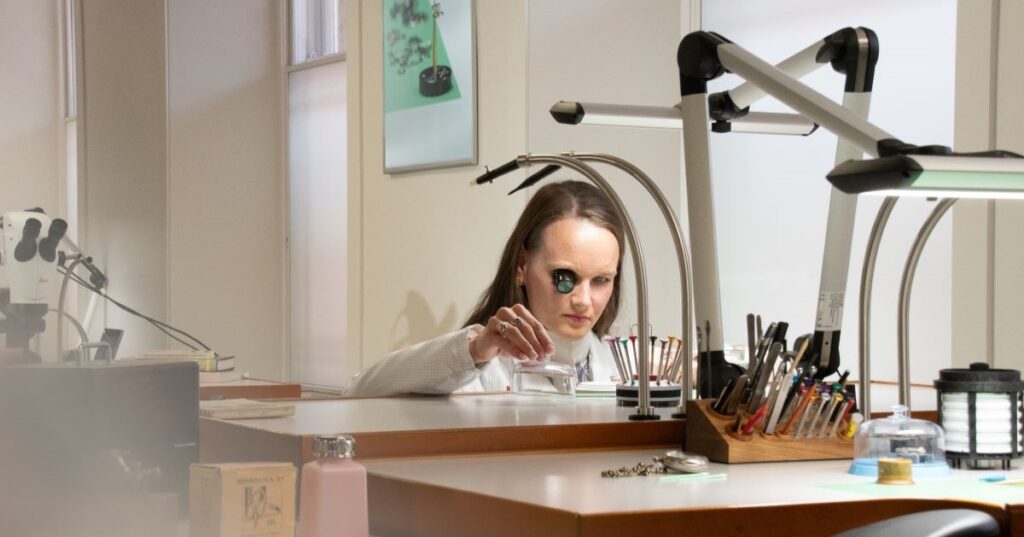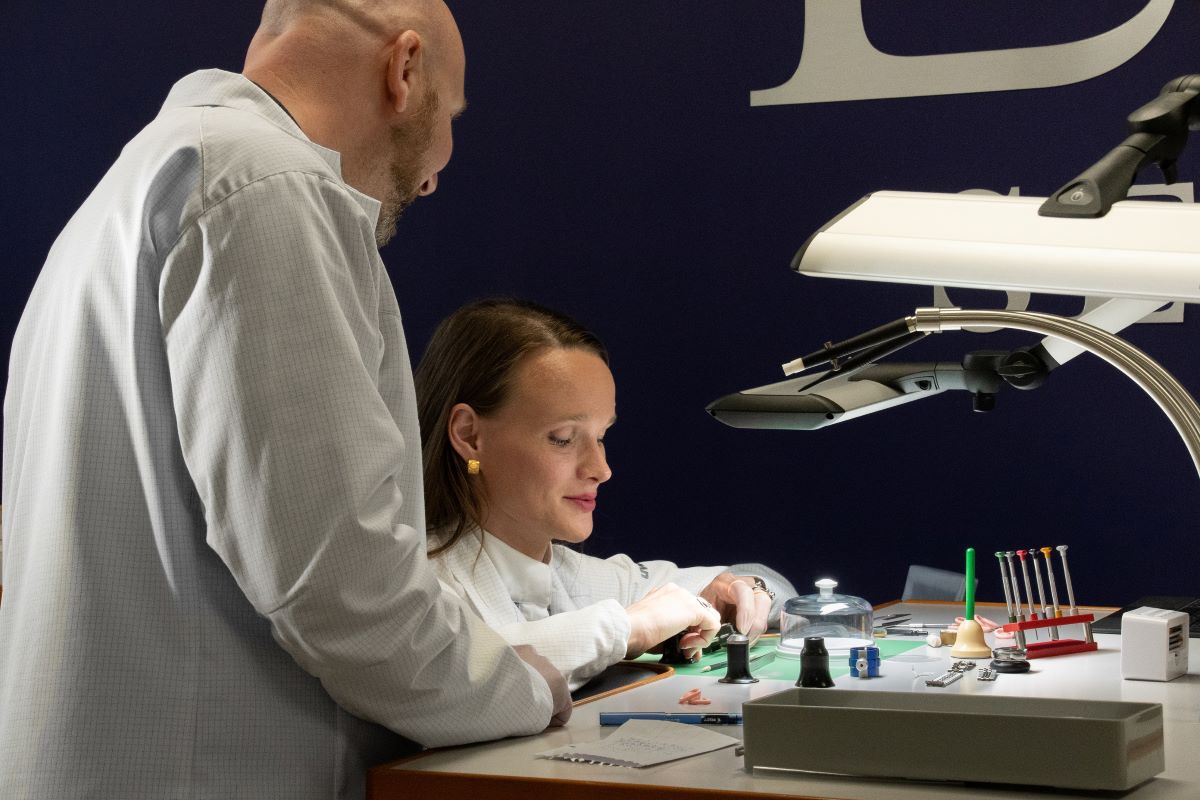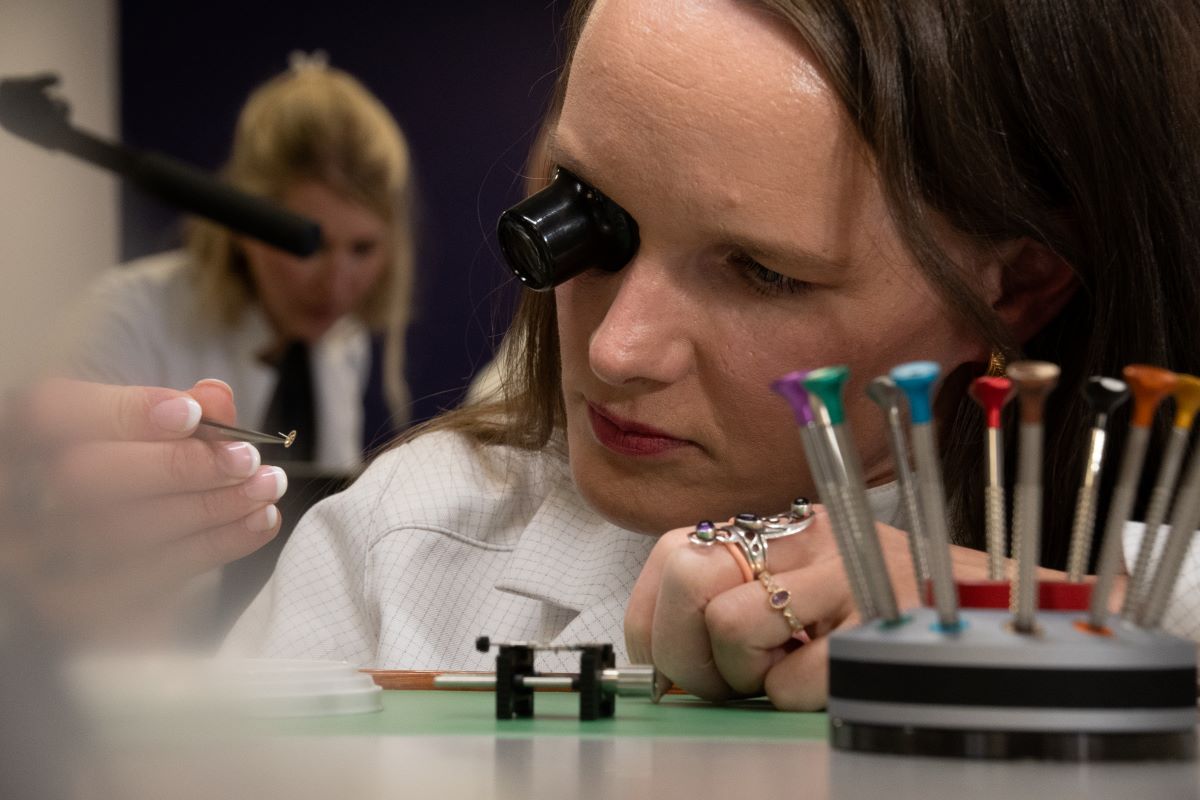
Life With a horologist: ‘In watchmaking you can’t cut corners or learn things overnight, it takes time’
Laings watchmaker Annika Leppala on following in her grandfather’s footsteps as a horologist, learning the art of patience in a world full of immediacy and how being a professional oboe player helped her hone her craft.
I think sometimes the most important things in life happen by chance, like meeting your partner or finding your profession. I wasn’t drawn to horology or ever thought I would be a watchmaker when I was younger. My grandfather was a watchmaker so I was used to seeing a lot of clocks and some watchmaking tools at my grandparents place but never felt the calling to do what he did.
As a child, I really liked to take things apart, ball pointed pens, any toys that would have screws and could be dismantled, books that had moving parts. I wanted to know how different things worked behind the scenes.
I think, in general, I am drawn to difficult or almost impossible things. I have a masters in music, playing the oboe, which is one of the most difficult instruments to learn, and before watchmaking, I was a professional oboist. Somebody told me that watchmaking is really difficult and I soon started to form an interest. The idea of keeping the trade alive in the family felt very meaningful. I trained at the Finnish School of Watchmaking, graduating in 2021 and joined Laings a year later.
I remember really enjoying watching artists making things with their hands, whether it was pottery, wood intarsia or anything where somebody would create something beautiful. I’m surprised it took me so long to actually find myself working in a trade where you work with your hands.
I’ve always loved antiques and vintage or historic things and what I love about horology is that it has a connection to the past. A mechanical watch will be the same for centuries and yet, still works around the same principles. That is something I find quite comforting especially now that we are surrounded by modern technology which is usually so complicated.
‘I love that you can see the end result of your work every time’

Annika trained at the Finnish School of Watchmaking, graduating in 2021 and joined Laings a year later.
I usually get up quite early, a little after 6am. I get the children ready for nursery and head to work early. I like to have a moment for myself and settle in for the day. I put on my lab coat and work shoes before entering the workshop – it is vital that the space is kept as clean as possible so no dirt or dust can get inside the watches.
I tend to start with a couple diagnostics on mechanical watches that are sent to the workshop for service. Then I move on to actual services – dismantling the watch, taking the movement and glass out, detaching the bracelet and getting the metal parts cleaned for the polisher. After that, I disassemble the movement and check if there are any further parts that I need to order. Then I put all the movement parts in the washing machine and when they are clean I can start assembling the watch.
Most people think watchmaking is just taking the movement apart and putting it back together, but there are many checks and adjustments you need to make during the service so the watch can actually do what it is meant to do and keep time.
‘In watchmaking, you can’t cut corners, it takes time’
When the movement is serviced and possible corrections are done, I put the case back together, get the movement back in before finally testing the watch pressure for water resistance. Sometimes there are watches that need more attention and you have to use all your experience to figure out why they aren’t working or why the water resistance test is failing. Luckily, when working in a workshop with other watchmakers, you can always get a second opinion.
I love that you can see the end result of your work every time. When a watch comes in, it might run poorly and not keep time, and look very worn, but after a proper service, clean, and polish, it looks like new.
You need a lot of patience, dexterity and concentration. It can be tiring. When I started training at Finnish School of Watchmaking, I remember going home and just staring at the wall for a while because my brain was just so tired. It really takes time to build concentration. Over time you get more used to it and it becomes easier.
I think I had an advantage with my background in classical music. As a musician, you are used to practicing the same piece for months trying to perfect it. So I already had a good base for concentration and understanding of what it is to practice something that is really difficult. I also knew to trust the process and not to worry too much if something felt too difficult at first. I think that is also the reason why I enjoy watchmaking so much.
Nowadays there is a lot of emphasis on things being easy and at your disposal immediately. In watchmaking, you can’t cut corners and you can’t learn things overnight, it takes time and this is something that really fascinates me – you have to work hard but eventually you will get there.
‘I still have my great grandmother’s wrist watch from the 1930s, I have never worn it’

‘As a musician, you are used to practicing the same piece for months trying to perfect it. So I already had a good base for concentration.’
At the moment my own collection of watches is quite small. I have my mother’s old Zenith Sporto which she had as a teenager. When I was around six, I had a green and red Gucci watch which I really liked but unfortunately I lost it, something that still bothers me as I would love to have it to add to my collection. I also have my great grandmother’s tiny wrist watch from the 1930s. I’ve never worn it, but would like to service it some day.
The first watch service I did in school has always stayed with me. In the Finnish School of Watchmaking, my teacher was gracious enough to give me an old golden Eterna Pocket watch. It had been given as a gift a long time ago to an employee for 50 years of service. It was a gorgeous Art deco style pocket watch and the engraving on the back was very beautifully done. You could really feel the sentimental value while handling it. I felt really honoured to have serviced it and it remains my favourite to this day.
I finish at 5pm and get home around 6pm. There is no better way to switch off than to have two little monkeys climbing over you before you even get the chance to close the front door behind you. I really treasure this time with my kids as it gives me a healthy balance in life.
Read more from the Life With series here.
Subscribe to read the latest issue of Scottish Field.
TAGS

